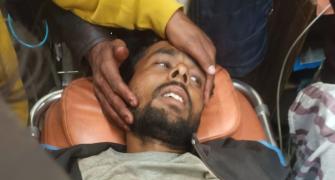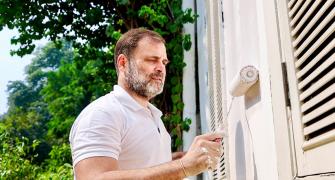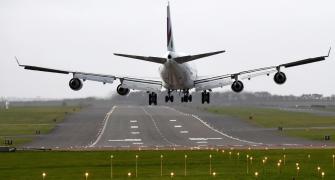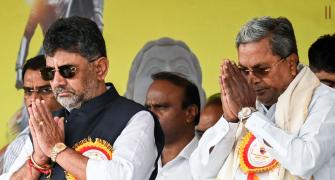The Rahul Gandhi effect was visible at the Congress Working Committee meeting that decided on Thursday to reserve 30 per cent of the party ticket for the youth in the forthcoming Lok Sabha elections.
The meeting felt such a move would sway the young voters whose ballot may be decisive in deciding who wins, articularly when ranged against the party is the Bhartiya Janata Party led by octogenarian L K Advani.
The CWC, the highest decision-making body that met at Sonia Gandhi's residence to discuss strategies for the elections, also declared that the Congress will contest the polls under its banner and manifesto.
"The Congress will seek votes on its own, except in states where it is in alliance," announced general secretary Janardan Dwivedi, who briefed the media.
The CWC also decided to prefer the post-poll alliance with the like-minded parties instead of forging any national alliance during the elections, beyond the state-level alliances the Congress already has.
The decision sends a firm message to the Nationalist Congress Party of Sharad Pawar not to expect seats outside their alliance in Maharashtra as also to the Samajwadi Party of Mulayam Singh that the poll alliance with it would be limited to only Uttar Pradesh and not force the Congress to yield it seats in several states. The seat adjustments will be limited to the state level, Dwivedi underlined.
A top party source said there was intense demand from several leaders, including UP general secretary Digvijay Singh, to snap further talks with Samajwadi Party as they were angry at the party announcing its candidates for 54 seats in the state even before finalising the seat arrangement with the Congress. Mulayam Singh's tie-up with former BJP chief minister Kalyan Singh also came under severe criticism as nobody in the Congress wants to have any truck with a communalist, the source said.
The final shot came from Rahul Gandhi, who is also one of the general secretaries, to assert that the Congress should keep in view its long-term interests and not to yield to the blackmail of the regional parties.
He suggested that the Congress should better play a "destructive" role, if necessary. When Sonia Gandhi intervened to know if the ruling BSP would not gain from the Congress being "destructive" towards the Samajwadi Party, Rahul was quoted stressing that such a role would prove "constructive" in the long run for rebuilding the party in the state.
The overwhelming consensus was that the Samajwadi Party offering just 16 of the 80 seats in UP to the Congress was just not acceptable. A senior leader suggested that the Congress too give a counter-offer of 16:16 seats to the SP and the remaining 48 seats remaining free.
Sources said no final decision was, however, taken on the deal with the Samajwadi Party as Foreign and Finance Minister Pranab Mukherjee intervened to let other issues discuss, suggesting that the final call on the subject be left to Sonia Gandhi.
Railway Minister Lalu Prasad also came under criticism for demanding the lion share of seats in Bihar for his Rashtriya Janata Dal in Bihar and offering just the three seats, which the Congress had won in the last election. If the Congress accepts such propositions, it will not be able to grow in any state, the leaders stressed.
The CWC decided to convey to all the regional parties desirous of the pre-poll alliance a formula practised in the past that the regional parties get the bulk of seats in the assembly elections and the national party, that is Congress, gets the bigger slice in the cake in the Lok Sabha elections.
Dwivedi said the CWC discussed the demand made by more than one ally for seats in several states and decided that these allies should limit adjustments only at the state level. They are free to fight on their own in other states, but without expecting the Congress to leave any seat for them outside the state of their prime influence.
"We do not have an alliance at the national level. We have alliance partners and seat adjustments at the state level," Dwivedi said.
He also hinted that the alliances may change after he elections when he said the alliance is a game of numbers and "it depends on who gets how many seats." That will be clear only after the elections, Dwivedi remarked.
Dwivedi, who is known as one of the top confidants of Sonia Gandhi and also her speech writer, was at pains to stress that the Congress was not dumping the ruling United Progressive Alliance on the eve of the elections by declaring to go to polls on its own. Asked if it would not result in UPA disintegrating, he snapped back: "Of course, there is UPA. But UPA does not fight elections. It is the political parties in UPA which contest elections."
As regards sharing of seats with the political parties in the state, he said the state Congress leadership would bargain and decide at the state level, keeping in view the local situation, and under the guidance of the Congress high command.







